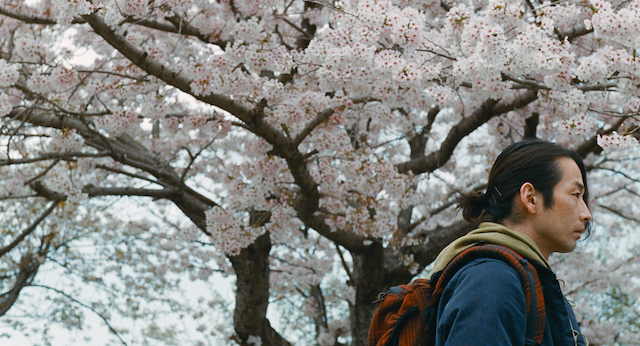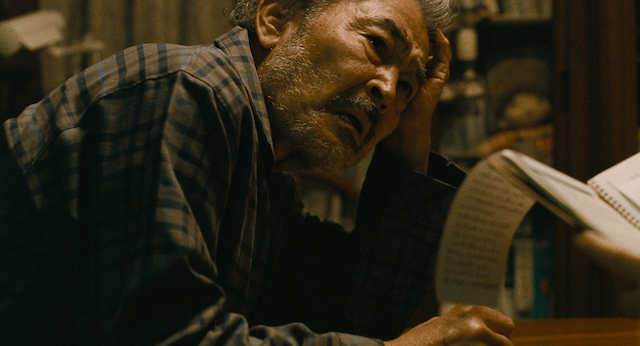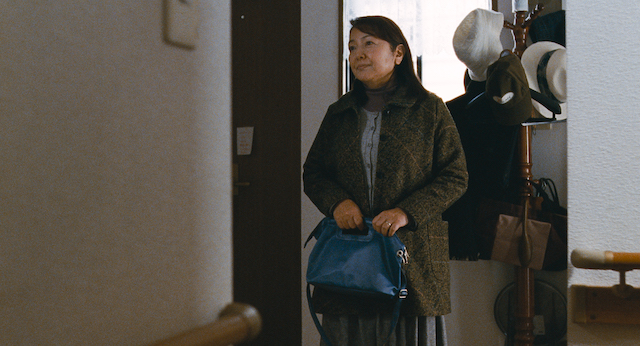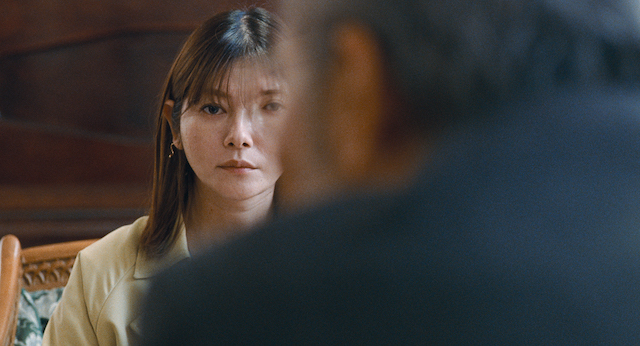
I’ll remember it all. Though I won’t recall it. The words echo in the theater and a man’s androgynous face makes expressive grimaces on a large screen. In front of it, the same man, long haired with sideboards, moves down in fright, like he’s detaching himself. Just before, a police squad has arrived at a house where an old man with dementia lives. The beginning of Great Absence is highly intense but will soon unfold into a calmly dense drama. The loose ends of life will be woven together when the actor is reunited, after many years, with his patriarchal father who has lost touch with reality. One of Japan’s new great filmmakers Kei Chika-ura makes a film about absence and atonement, wrapped in the fading spiral of memory. Great Absence, featuring legendary actor Tatsuya Fuji, is a deep and devastating delight.
To remember the past is not something you always want to recall. For Takashi (Mirai Moriyama), the actor in question, has a past that he thought was forgotten and lost. After his stage rehearsal in Tokyo, he receives a phone call from a local police station in northern Japan that something has happened to his father Yohji (Tatsuya Fuji), the 71-year-old retired university teacher. He flies up with his wife Yuki (Yōko Maki) with indifference in his eyes. His estranged father, who he has barely seen in the last decades, has begun to show signs of rapidly progressive dementia. Their relationship is strained, to say the least. Once in place, in the messy house filled with random notes and a diary, he begins to find clues of a mystery about the unexplained disappearance of the father’s devoted second wife, Naomi (Hideko Hara) – the woman the father left the family for.
The father is a real patriarch. When we meet him at the care facility, he is elegant on the surface, but the once sharp brain has decayed. Paranoia has taken over – reality and fantasy have merged as he descents into the fog. He’s in another world and babbles about being kidnapped. In flashbacks from the past, we slowly learn who he once was, an eloquent speaker and a selfish oppressor, who lectures and contradicts everything his son says and treats his wife manipulatively and sometimes aggressively. It also appears that he was violent towards both. But through the diary it’s revealed he had a loving and passionate side as well.

©Courtesy of Japan Cuts
Veteran actor Tatsuya Fuji, who has since the beginning of 60s played over 150 roles, and worked with directors such as Nagisa Ōshima, Takeshi Kitano and Kiyoshi Kurosawa, portrays the complex and multi-layered Yohji with such intensity and depth that the film’s calm tone becomes a suggestive volcano. Unforgettably, he drills a hole in the screen as he balances the vulnerably sweet with authority and anger.
In an early flashback scene, when the son visits and talks about the fun of acting, the father breaks into a lecturing monologue which turns out to be one of the film’s themes. He says: “Playing the part of someone who really existed in the past wouldn’t be fun at all. Even if you did research on that person, you wouldn’t find the right answer. If you think you know the correct answer, then you’re deceiving yourself”. And the film won’t try to give one correct answer who in fact this man is and who he was, and what really happened. Like memory, a person is fragmentary. And like a person, the structure of the film is fragmentary. Time and space dissolve as we move along.
Why the son doesn’t fully hate his father becomes clearer but is perhaps unexplainable. A relationship to a father, who you are about to lose, has many sides. Together with screenwriter Keita Kumano, Kei Chika-ura has in his second feature film (first was Complicity, 2018) created a poetic and subtle portray of a contradictory man, both for the audience and for the son, inspired by his own experience of his father’s sudden dementia.

©Courtesy of Japan Cuts
Shot on 35mm film by regular Hirokazu Kore-eda DP Yutaka Yamazaki (Nobody Knows, 2004, Still Walking, 2008), accompanied by original music by Koji Itoyama, and seamlessly edited by Kei Chika-ura himself, the film handles the knotty narrative with grace and nuance remembering great absence in life. Great absence as in both the father’s physical and emotional absence, and deep inside the father’s memory and in the son’s longing. Inspired by the masters, French Jean-Luc Godard and Portuguese Miquel Gomes, whom Kei Chika-ura worked with in this year’s Cannes winning film Grand Tour (2024), the young director creates a puzzle when giving meaning to power of absence. This is also what makes the film excellent – sharp yet mysterious with a narrative depth.
Treating dementia on film is perplexing. The confusion, the outbursts, the unknown and helplessness of the relatives. The subject has been explored before, successfully in Florian Zeller’s The Father (2020) and Sarah Polley’s Away from Her (2006) and in Maite Alberdi’s documentary The Eternal Memory (2023). Great Absence wraps its unorthodox story in a mysterious tissue, as labyrinthine as the disease itself. Remember the name and recall his story, Kei Chika-ura hereby swims in the same water as his Japanese compatriots Hirokazu Kore-eda (Shoplifters, 2018) and Ryûsuke Hamaguchi (Drive My Car, 2021). Hats off.

©Courtesy of Japan Cuts
Grade: A-
Great Absence will be screened July 18th at Japan Cuts in New York followed by Lifetime Achievement Award Presentation for Tatsuya Fuji and opens theatrically July 19th in New York and July 26th in Los Angeles.
If you like the article, share your thoughts below!
Check out more of Niclas’ articles.
Here’s the trailer of the film.

